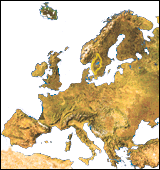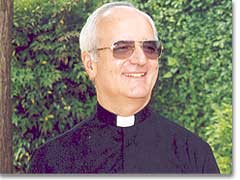 |
|
En discusión: los raíces cristianos de Europa In discussion: the Christian roots of Europe Umkämpft: die christlichen Wurzeln Europas |
|
 |
|
Se trata del aporte de la Iglesia a la Constitución de la nueva Europa It is about the contribution of the Church to the Constitution of the new Europe Es geht um den Beitrag der Kirche zur Verfassung des neues Europa Fotos: Archiv |
|
 |
|
Autor: P. Alberto Eronti, Roma Author: Fr. Alberto Eronti, Rome Autor: P. Alberto Eronti, Rom Foto: Gold © 2003 |
|
|
ROME, Fr. Alberto Eronti. In the Pontifical Council for the laity was held the second semester meeting between the Council Board and the Movements and New Communities of the Church who in a total of 25 responded to the invitation. As announced in the previous meeting the subject was: The contribution of the Church to the constitution of the New Europe.
The session was opened by Cardinal Stafford. He expressed that the Pope sees the contribution of the Church to Europe as part of his mission. But this contribution of the Church goes together with its capacity of being, of being in sanctity. The Church is a mystery of communion and will give it to Europe one and multiple with its whole life. This is why the Pope gives a call to all movements and new Communities, so that with each groupís contribution the whole Church will project and serve in a larger abundance of life. Mary, the Cardinal said, spoke few words but she gave everything. This will do the Church today. The Council is your "house" and by bringing your life experience with you, your thoughts and feelings, you are helping us and helping the Pope to define now the Churchís contribution to the Europe of the future. That is why all of you come here to your house, to share that life that the Spirit is giving you, to make the Church richer and fruitful.
Why does the Church insist on mentioning Christianity in the European Constitution?
Mons. Rylko introduced the lecture of Mons. Aldo Giordano, Secretary General of the Episcopal Council of Europe. Mons. Giordano started by explaining why the Catholic Church insists that Christianity and/or God be mentioned in the Preamble of the European Constitution. It is for the benefit of Europe not of the Church. The Church does not need to be mentioned or to be recognized, it will continue living. But it will not be the same for Europe if it is not mentioned and its roots are forgotten: these are the founding values that will help Europe in its urgent need for unity. How to overcome the mistrust of the parts?, by coming together in what they have in common: their values and their culture. Their faith in Christ is their common reality. But these values and this faith will help to attract other beliefs and cultures of more recent emergence, as it is the more and more notorious presence of Islam.
Fraternity strength for a Europe who looks for a common identity
What is the contribution of the Church to the European Union? She contributes by being communion, and should be even more, this is why the growing effort for a serious and purposely found ecumenical. The Church has fundamental contributions for the dignity of mankind, of the person as an end not as a mean. The Church has fraternity forces for a Europe needing to solidify in its multiplicity. By the power of the Spirit intervention, the Church has the possibility of giving soul and spirit to the letter of the Constitution, and life giving content to the words. The Church has a contribution to the subject of freedom without falling in subjectivity or individuality. The Church knows about the person, the family, the value of life, the dignity of labor, the yearning for happiness and for mankindís fulfillment. This is its patrimony, the treasure she can and wishes to present in the light of the Gospel!
A challenge for the Church, today and always: to respond to the questions of existence.
But there is a danger for the Church in this time in history: to be left without the capacity to give an adequate answer to the present challenges and to the perennial questions of existence. We need a clear will, a bigger and new vitality to respond to the supreme wishes of todayís man. The enduring questions confronting the present needs: lifeís meaning, happiness, love, pain, death, injustice and the where do I come from, where am I going. The need for transcending and the right to a personal fulfillment.
Father of the New Europe
Following Mons. Giordanoís lecture there was a dialogue. I mention only two of the answers. To the question: What makes many of the members of the Commission to object or reject the reference to Christianity? Many of the members of the Commission have ideology reservations, as if they stayed in the past. For a long time now and more so since Vatican Council II, the Church has no temporal power, nor political or economical. The Church is conscious of being of service and not to dominate. In the past it was not like this, and this generated an anti-clergy attitude and a negative feeling for the Church which still persists in many. It was not a coincidence that the Pope asked the world to forgive the historic sins of many of the sons of the Church. But the ecclesiastic of Vatican II, so clearly expressed by Paul VI and enriched by John Paul II goes a different way. This has not yet been fully understood by many who still move in the old schemes of power and influence. This explains the position of some who are against the mention of Christianity. The second question: Why has the Pope put so much effort in supporting and guiding the making of the European Union? Before John Paul II, the Popes had in all about 130 interventions over Europe and its identity. This Pope has in 25 years had over 700 interventions among speeches, documents and other. Nobody said so much and enlightened in such a way the possibilities for the New Europe like John Paul II. It is why some call him already "the father of the New Europe."
The Contribution of the Movements and Communities.
After a coffee brake the audience had a chance to speak their ideas under the light of their own charisma. In synthesis:
The urgent need for announcing the values and clarify their content.
The Movements are already advancing the New Europe, being Europeans or international, when they meet and the members are united by one ideal, one language, one common mission. The Movements are a European or international family, the nationalities have left the place to what is common for all: the charisma and being part of the same. Love makes them one and multiple, joyful and spontaneous. This very meeting is already an experience of what we imagine for the future. This is what the New Europe needs!
The Church has a word that is a gift necessary for the unity: the word "forgiveness." If the word is not followed by action, if the word doesnít become an attitude of the soul and stronger love, there will be no union in the multiplicity.
The New Europe is asking for a new Christian way in Europe. A new man and a new community, able to form a family, create attachments, dissolve fears with love.
There will be no fraternity and peace founded in freedom and justice if the Christians are not able of using the power of love, of forgiving, of reaching the blessing of being "called sons of God."(Mt. 5,9).
At the end Mons. Rylko said: The contribution of each Movement and New Community shows the new face of the Church: authentic, joyful, enthusiastic, hopeful, serving, immersed in the world and friend of mankind. These you must give with intensity and loyalty. Cardinal Stafford said good-by with a Thank you! Thank you! I think this was an intense and productive meeting. Little by little these meetings get better defined and more attractive, richer in content and perspective. We are working in the heart of the Church!
Translation: Carmen Barruel, Belgium